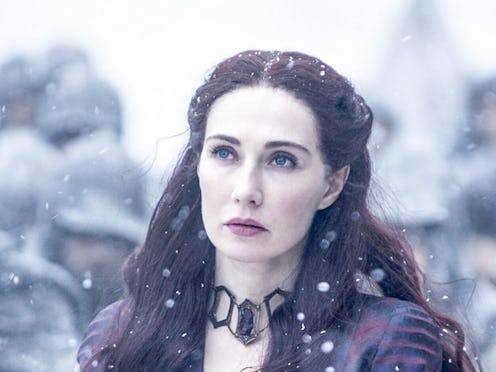
Melisandre has been going on about the Lord of Light, or "the one true god," for four seasons now, but what is the Lord of Light on Game of Thrones really? In the Season 6 episode "Hold the Door," a new Red Priestess, Kinvara, suggested the Lord of Light might be a more tangible presence than anyone ever imagined. Kinvara knew about the most private experience of Varys' life, and even offered to name the voice he heard speak to him the night he became a eunuch. Kinarva's insight appeared to be more than a parlor trick. Her belief in Dany as the one who was promised comes from a place of deep religious belief, but is there a man behind the flames of R'hllor or is the Lord of Light simply an idea?
When it comes to religion in the world of Game of Thrones , the show has tended to paint the devout as zealots. The High Sparrow and his ilk reek of corruption and sanctimony, and Melisandre has never been the picture of sanity. She may be able to raise the dead and hide her true form, but she also advocates human sacrifice. From the burning of Shireen to Cersei's walk of shame and the many assassinations done in the name of the Many Faced God, religious acts have traditionally been bloody and highly questionable in this world.
There are a few things fans know for sure though: magic exists, and the prophecy of the Lord of Light appears to be coming to pass. The Lord of Light's followers believe their god is locked in a battle with the Great Other (potentially the Night's King and his army), and it is only through the rebirth of Azor Ahai that the world can be saved. The followers of the Lord of Light believe the battle is very real and its players are physical entities.
Both Melisandre and Kinvara have claimed the Lord of Light speaks directly to them, but the audience has yet to hear a voice. From the perspective of the viewer, characters like Melisandre and Kinvara may believe the Lord of Light is a god with a voice and a will, but, until that voice is heard onscreen, it leaves a huge question mark by the Lord of Light.
What Melisandre and Kinvara call the Lord of Light could be a force, something beyond human understanding. The Lord of Light could be the magic that brings people back from the dead, the giver of prophetic dreams, and the ancient source of the Children of the Forest's ability to create the White Walkers. When it comes to religion, you have to believe in what you cannot see, no matter what your faith is. The Red priests and priestesses may call their god the Lord of Light, but they could be completely off base. The old gods of the North could be the ones pulling the strings, or the Seven, or hey, even the Drowned God. All of these "gods" could just be ideas, names for the magic flowing through the world that the characters cannot fully understand.
The other possibility is the Lord of Light is human. He could be speaking directly to his chosen people and maneuvering Dany, Tyrion, Jon Snow, and the rest of the characters into place so the grand battle between light and dark can play out. Maybe he doesn't see himself as a god, but his power is so expansive that he allows people to believe he is. A Reddit user even recently posited Bran Stark could be the Lord of Light thanks to his ability to warg into humans and the Night King's interest in killing him.
It makes just as much sense for the Lord of Light to be someone ancient from the time before the Children of the Forest created the White Walkers. Maybe he was even the one who drove the dagger into the Night King's chest — in which case, he would be a she according to the scene from the show. Nothing prompts the creation of a religion quite like unleashing pure evil on the world, am I right?
There is a good chance the mystery of who or what the Lord of Light truly is will never be solved. Even if the war between fire and ice plays out, that does not prove the existence of a Lord of Light. As with all religions, the Lord of Light is whatever you want it to be — at least until he, she, or it makes its presence known in a significant, tangible way.
Images: HBO; Giphy (2)